CLINICS
Dermatology
Core disciplines of our dermatologist
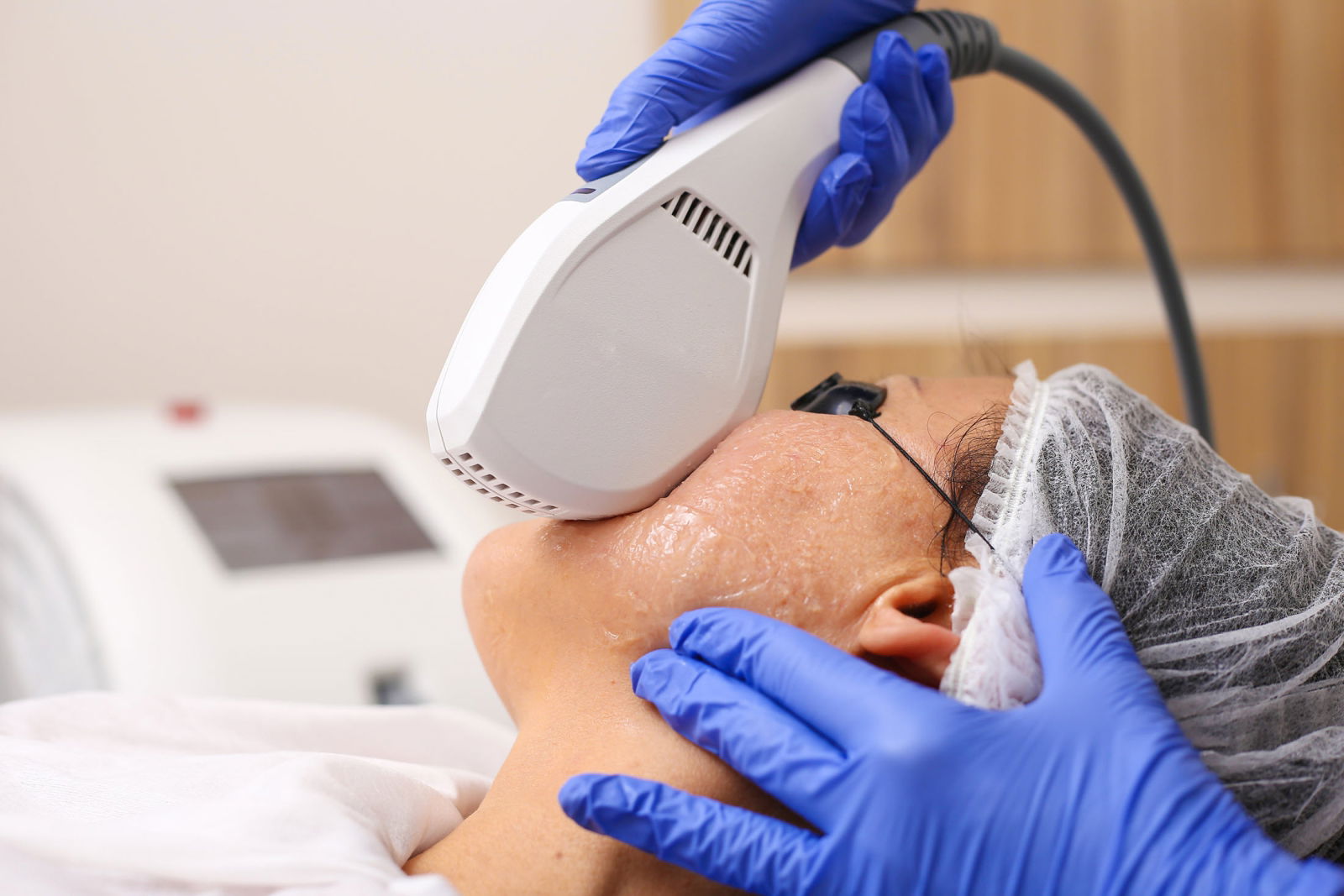
The dermatologist is specialized in treating the skin. Patients with skin problems come to you for a diagnosis or treatment. This can be when complaints are minor and harmless, but there can also be something serious or life-threatening going on. If you from acne, a bump or rash on the body, you are welcome for consultation.
The complaints can be minor and cosmetic, such as the removal of moles or warts. Our center for cosmetics is working closely with the dermatologist. Read more about this on our page CENTERS.
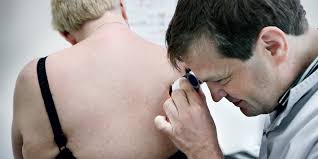
Treatment can be several: from prescribing the medicines, solving bumps or other irregularities on the skin, or take a 'biopsy', a sample of the tissue. With a biopsy you can see whether a tissue is benign or malignant. You also perform medical procedures, such as skin grafts or the removal of scar tissue.
- Investigate patients' skin problems
- determine what the best treatment is
- prescribe medication
- remove moles, warts or cysts
- perform minor surgical procedures
- maintain contact with the patient about the healing process

The dermatologist is specialized in treating the skin. Patients with skin problems come to you for a diagnosis or treatment. This can be when complaints are minor and harmless, but there can also be something serious or life-threatening going on. If you from acne, a bump or rash on the body, you are welcome for consultation.
The complaints can be minor and cosmetic, such as the removal of moles or warts. Our center for cosmetics is working closely with the dermatologist. Read more about this on our page CENTERS.

Treatment can be several: from prescribing the medicines, solving bumps or other irregularities on the skin, or take a 'biopsy', a sample of the tissue. With a biopsy you can see whether a tissue is benign or malignant. You also perform medical procedures, such as skin grafts or the removal of scar tissue.
Gynecology/Obstetrics
The Department of Obstetrics and Gynecology consists of 3 departments: The gynecologist also guides you if your pregnancy requires extra care and with pelvic floor problems. We have various specialised consultations. This way we can offer you tailor-made care in every situation. For example, there is our pelvic floor consultation for a prolapse or incontinence. Or the consultation for abnormal smears. We work closely with other departments. For example, with the oncologists for forms of gynaecological cancer. Collaboration ensures that we have the best knowledge and experience together, and can give you the best treatment.
The gynecologist also guides you if your pregnancy requires extra care and with pelvic floor problems. We have various specialised consultations. This way we can offer you tailor-made care in every situation. For example, there is our pelvic floor consultation for a prolapse or incontinence. Or the consultation for abnormal smears. We work closely with other departments. For example, with the oncologists for forms of gynaecological cancer. Collaboration ensures that we have the best knowledge and experience together, and can give you the best treatment.
 ‘Obstetrics’ means the branch of medicine that deals with pregnancy and childbirth. An obstetric nurse is therefore specialized in guiding (expectant) mothers. As long as they are in the hospital, the obstetric nurse takes care of both the mother and the newborn child. That is before, during and after childbirth.
‘Obstetrics’ means the branch of medicine that deals with pregnancy and childbirth. An obstetric nurse is therefore specialized in guiding (expectant) mothers. As long as they are in the hospital, the obstetric nurse takes care of both the mother and the newborn child. That is before, during and after childbirth.
- Center for Pregnant Women : focuses on pregnancy, including prenatal diagnosis and childbirth
- Gynecology : Gynecology is the specialty that deals with disorders and abnormalities of the female reproductive organs
- Reproductive medicine : the specialty for the investigation and treatment of fertility disorders.
 Gynecology deals with the treatment of diseases and disorders of the female organs. After determining the cause of the complaints, the gynecologist will draw up a treatment plan with you. If necessary, additional research may follow. The gynecologist examines and treats complaints of the female reproductive organs and fertility problems.
Gynecology deals with the treatment of diseases and disorders of the female organs. After determining the cause of the complaints, the gynecologist will draw up a treatment plan with you. If necessary, additional research may follow. The gynecologist examines and treats complaints of the female reproductive organs and fertility problems.
 The gynecologist also guides you if your pregnancy requires extra care and with pelvic floor problems. We have various specialised consultations. This way we can offer you tailor-made care in every situation. For example, there is our pelvic floor consultation for a prolapse or incontinence. Or the consultation for abnormal smears. We work closely with other departments. For example, with the oncologists for forms of gynaecological cancer. Collaboration ensures that we have the best knowledge and experience together, and can give you the best treatment.
The gynecologist also guides you if your pregnancy requires extra care and with pelvic floor problems. We have various specialised consultations. This way we can offer you tailor-made care in every situation. For example, there is our pelvic floor consultation for a prolapse or incontinence. Or the consultation for abnormal smears. We work closely with other departments. For example, with the oncologists for forms of gynaecological cancer. Collaboration ensures that we have the best knowledge and experience together, and can give you the best treatment. ‘Obstetrics’ means the branch of medicine that deals with pregnancy and childbirth. An obstetric nurse is therefore specialized in guiding (expectant) mothers. As long as they are in the hospital, the obstetric nurse takes care of both the mother and the newborn child. That is before, during and after childbirth.
‘Obstetrics’ means the branch of medicine that deals with pregnancy and childbirth. An obstetric nurse is therefore specialized in guiding (expectant) mothers. As long as they are in the hospital, the obstetric nurse takes care of both the mother and the newborn child. That is before, during and after childbirth.Pediatrics
Specialism of our pediatrician
 He deals with the health and treatment of children and young people. He works closely with other specialists. He diagnose, can perscribe medicines, and make a treatment plan. Mean treatment is concentrated on: pulmonologics and specialized in stomach, liver and intestinal diseases. As you can see, this is a broad position within healthcare that can take you in different directions when you look for a good treatment for your child.
He deals with the health and treatment of children and young people. He works closely with other specialists. He diagnose, can perscribe medicines, and make a treatment plan. Mean treatment is concentrated on: pulmonologics and specialized in stomach, liver and intestinal diseases. As you can see, this is a broad position within healthcare that can take you in different directions when you look for a good treatment for your child.
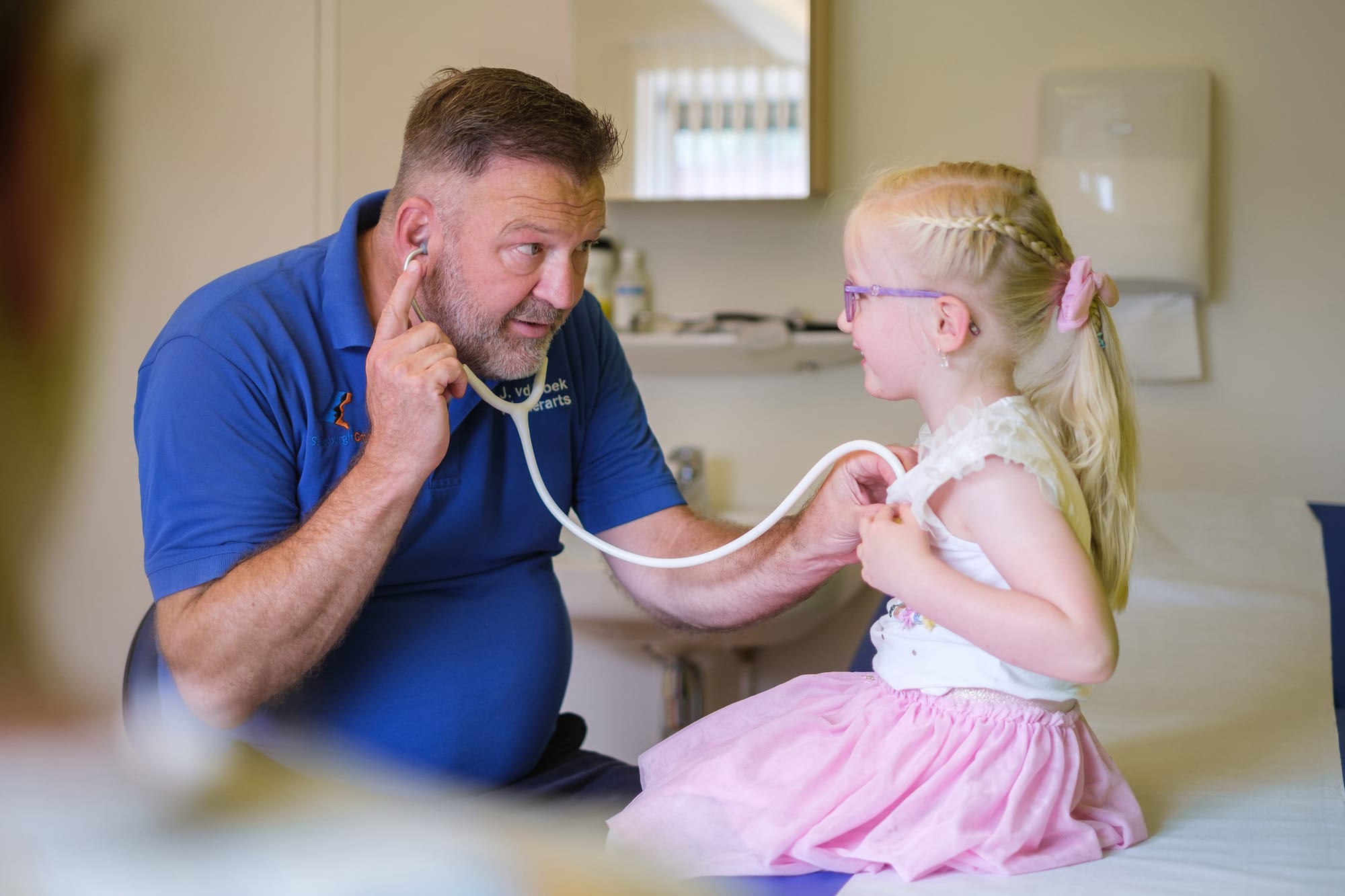 The pediatrician treat children of all ages: from newborns to 18-year-olds. They tailor the treatment and guidance of children to their age, body type, but also to their level of development. This is always done in close consultation with the patient's parents or caregivers.
The pediatrician treat children of all ages: from newborns to 18-year-olds. They tailor the treatment and guidance of children to their age, body type, but also to their level of development. This is always done in close consultation with the patient's parents or caregivers.
- pediatric cardiology
- pediatric neurology
- asthma
- pee and poop problems (PLOEP)
- obesity
- rhythm, crying or other problems (up to 4 years)
 He deals with the health and treatment of children and young people. He works closely with other specialists. He diagnose, can perscribe medicines, and make a treatment plan. Mean treatment is concentrated on: pulmonologics and specialized in stomach, liver and intestinal diseases. As you can see, this is a broad position within healthcare that can take you in different directions when you look for a good treatment for your child.
He deals with the health and treatment of children and young people. He works closely with other specialists. He diagnose, can perscribe medicines, and make a treatment plan. Mean treatment is concentrated on: pulmonologics and specialized in stomach, liver and intestinal diseases. As you can see, this is a broad position within healthcare that can take you in different directions when you look for a good treatment for your child. The pediatrician treat children of all ages: from newborns to 18-year-olds. They tailor the treatment and guidance of children to their age, body type, but also to their level of development. This is always done in close consultation with the patient's parents or caregivers.
The pediatrician treat children of all ages: from newborns to 18-year-olds. They tailor the treatment and guidance of children to their age, body type, but also to their level of development. This is always done in close consultation with the patient's parents or caregivers.Psychiatry
Specialism of psychiatry in our center: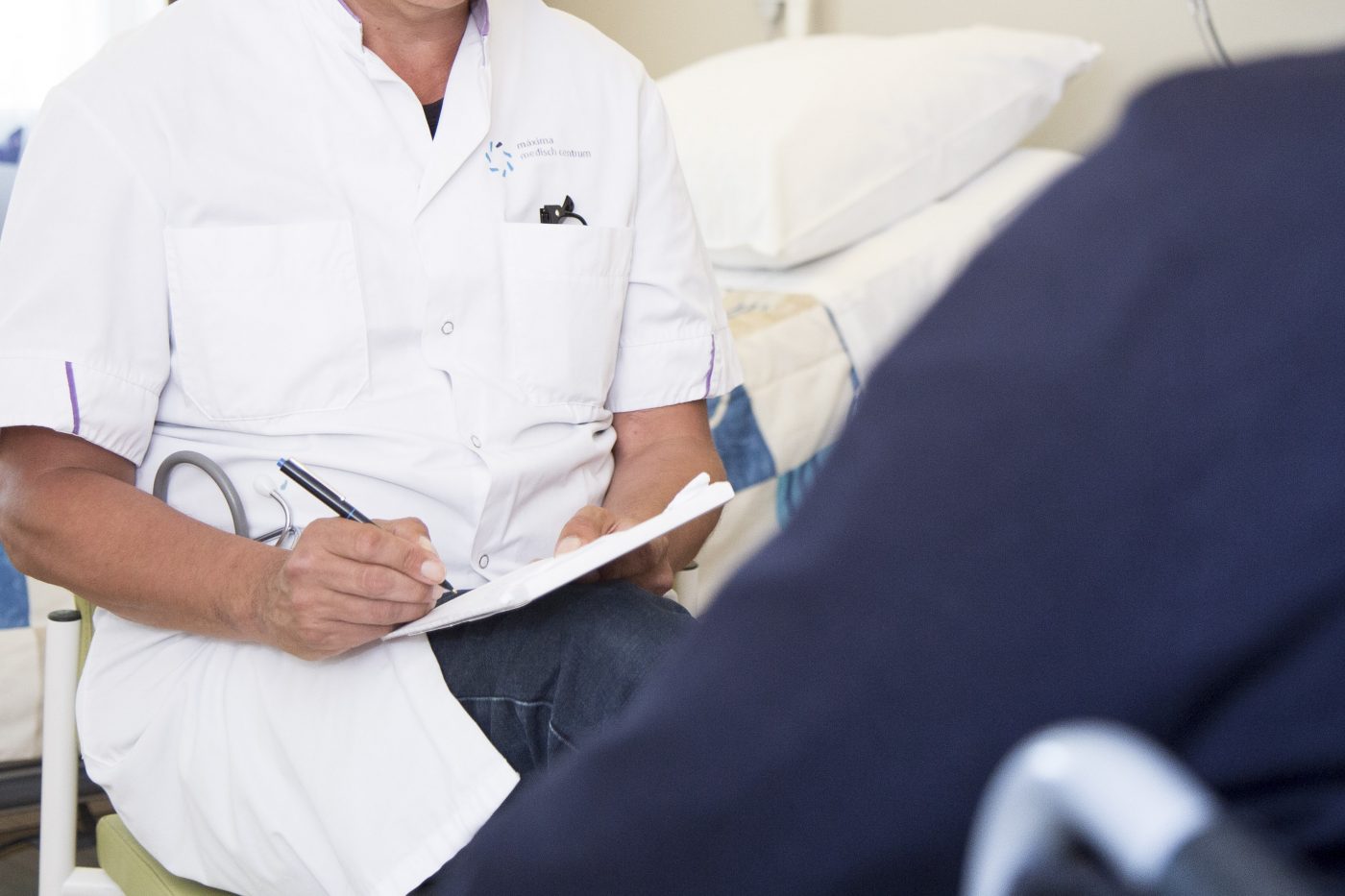 The psychaitrist conduct interviews with patients and make a diagnosis based on behavioral observations. After he/she drawing up a treatment plan (including any medications). If necessary, refer to other specialists (such as psychotherapists or movement therapists). Normally the doctor maintaining contact with the patient's GP and studying psychiatric patient records.
The psychaitrist conduct interviews with patients and make a diagnosis based on behavioral observations. After he/she drawing up a treatment plan (including any medications). If necessary, refer to other specialists (such as psychotherapists or movement therapists). Normally the doctor maintaining contact with the patient's GP and studying psychiatric patient records.
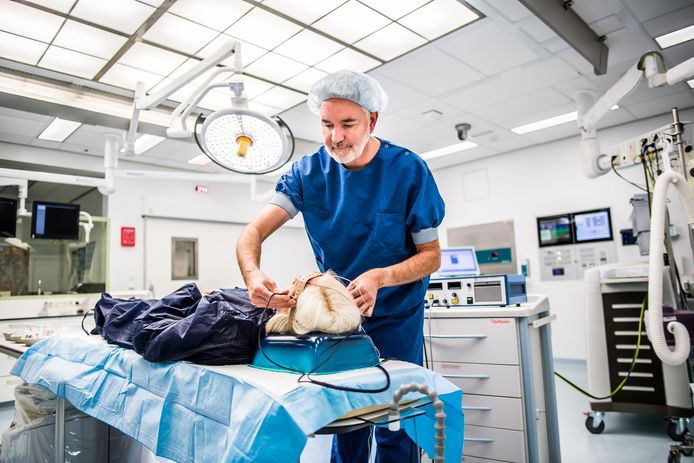 Our psychiatrist investigates the cause of the mental problems and then draws up a treatment plan together with the patient. Mental disorders can be psychoses and depressions, for example. If necessary, medication is prescribed. Special treatment in our center is electrowave therapy and ketamine therapy.
Our psychiatrist investigates the cause of the mental problems and then draws up a treatment plan together with the patient. Mental disorders can be psychoses and depressions, for example. If necessary, medication is prescribed. Special treatment in our center is electrowave therapy and ketamine therapy.
- adult, children and adolescent treatment
- neuropsychiatry
- perinatal and infant psychiatry
- psychatric therapy
 The psychaitrist conduct interviews with patients and make a diagnosis based on behavioral observations. After he/she drawing up a treatment plan (including any medications). If necessary, refer to other specialists (such as psychotherapists or movement therapists). Normally the doctor maintaining contact with the patient's GP and studying psychiatric patient records.
The psychaitrist conduct interviews with patients and make a diagnosis based on behavioral observations. After he/she drawing up a treatment plan (including any medications). If necessary, refer to other specialists (such as psychotherapists or movement therapists). Normally the doctor maintaining contact with the patient's GP and studying psychiatric patient records.  Our psychiatrist investigates the cause of the mental problems and then draws up a treatment plan together with the patient. Mental disorders can be psychoses and depressions, for example. If necessary, medication is prescribed. Special treatment in our center is electrowave therapy and ketamine therapy.
Our psychiatrist investigates the cause of the mental problems and then draws up a treatment plan together with the patient. Mental disorders can be psychoses and depressions, for example. If necessary, medication is prescribed. Special treatment in our center is electrowave therapy and ketamine therapy.Dentry
What are the core tasks of our dental clinic?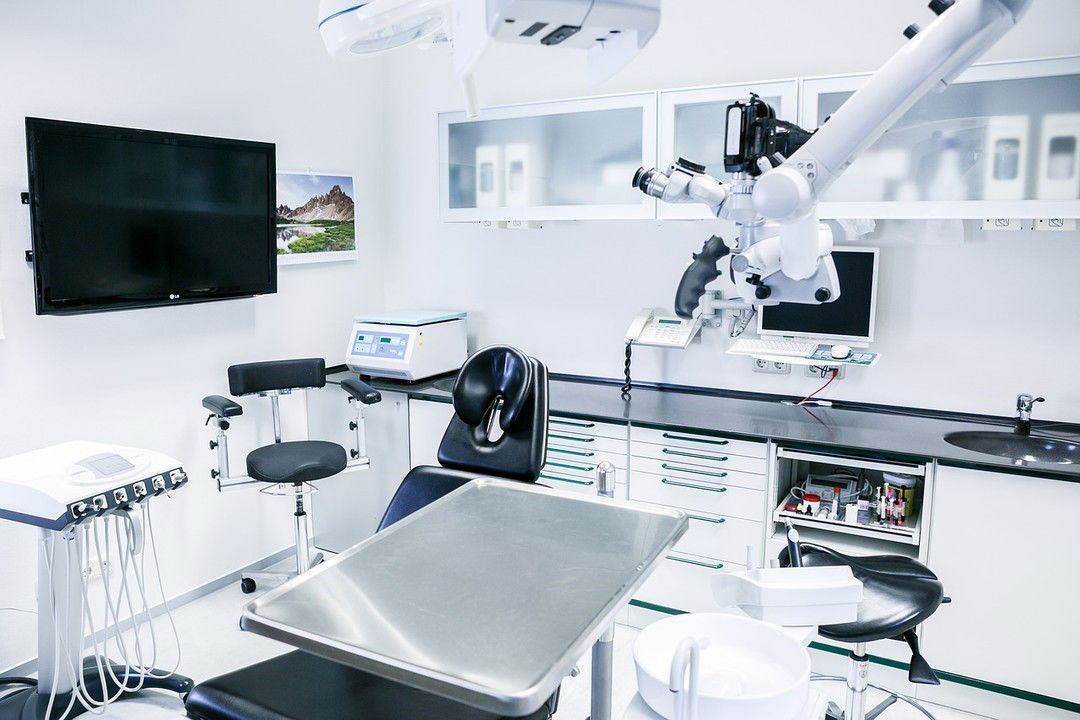 In the dental practice, the dentist works together with a dental team. This team can consist of a dental assistant (or more), a preventive assistant and a dental hygienist. Within this team, the dentist has a strong coordinating role. In addition, the dentist remains ultimately responsible.
In the dental practice, the dentist works together with a dental team. This team can consist of a dental assistant (or more), a preventive assistant and a dental hygienist. Within this team, the dentist has a strong coordinating role. In addition, the dentist remains ultimately responsible.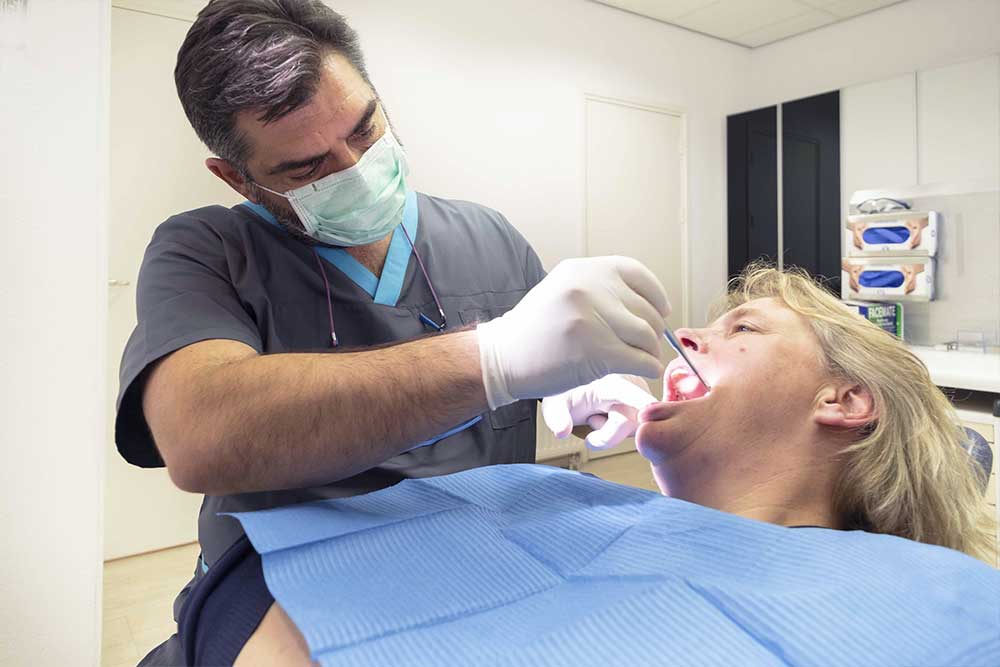 Specialities
Specialities
- General check-up of the teeth and surrounding tissues
- Giving anesthesia
- Treating tooth decay (caries and cavities)
- Treating gum disease
- Treating nerve inflammation
- Treating jaw joint complaints
- Performing root canal treatment
- Placing crowns and bridges on weak teeth and molars, possibly with associated implants
- Performing minor oral surgery (e.g. removing wisdom teeth)
- Brace treatments
- Treating dental injuries in accidents
- Prescribing medications
 In the dental practice, the dentist works together with a dental team. This team can consist of a dental assistant (or more), a preventive assistant and a dental hygienist. Within this team, the dentist has a strong coordinating role. In addition, the dentist remains ultimately responsible.
In the dental practice, the dentist works together with a dental team. This team can consist of a dental assistant (or more), a preventive assistant and a dental hygienist. Within this team, the dentist has a strong coordinating role. In addition, the dentist remains ultimately responsible. Specialities
Specialities- the pedodontry (children's dentist)
- the endodonty
- the orthodonty
- the fear dentry
- the implantology
- the periodontist
Anesthesiology
Anesthesiologist-pain specialists are experts in the treatment of chronic pain. This can be by drugs, injections, infusion and special technics (read more). Sometimes they work only as anesthesist in the hospital during surgeries, others work in pain centers, focussed on patients with acute and chronic pain complaints and for patients with cancer pain.
Our physician is specialized in:
Anesthesiologists work closely with neurologists, neurosurgeons, orthopedists, psychiatrists, psychologists, physiotherapists, rehabilitation physicians, nurses, nurse specialists and physician assistants. Each specialist has a different view of pain from his or her field of expertise. Together, they provide you with the best care for chronic pain.
 What can you expect?
What can you expect?
Before your first visit, you will usually fill out a number of questionnaires. With the questionnaires, the doctor will collect information about your health, medical history and the medications you are taking. During your first visit, the specialist will discuss your symptoms. Sometimes, the pain specialist will make an appointment with you for further examination or consultation with other specialists. The pain specialist will then try to make a diagnosis. In consultation with you, the pain specialist will draw up a treatment plan. Treatments can be aimed at the physical symptoms, such as medication, injections, nerve blocks or nerve stimulators and physiotherapy. Treatments sometimes also concern the consequences of pain and situations that make the pain worse, such as depression. You will often receive a combination of treatments.
Our physician is specialized in:
- treatment with drugs
- nerve block
- neuromodulation
- Qutenza
- TENS
- Pain rehibilitation

Anesthesiologists work closely with neurologists, neurosurgeons, orthopedists, psychiatrists, psychologists, physiotherapists, rehabilitation physicians, nurses, nurse specialists and physician assistants. Each specialist has a different view of pain from his or her field of expertise. Together, they provide you with the best care for chronic pain.
 What can you expect?
What can you expect?Before your first visit, you will usually fill out a number of questionnaires. With the questionnaires, the doctor will collect information about your health, medical history and the medications you are taking. During your first visit, the specialist will discuss your symptoms. Sometimes, the pain specialist will make an appointment with you for further examination or consultation with other specialists. The pain specialist will then try to make a diagnosis. In consultation with you, the pain specialist will draw up a treatment plan. Treatments can be aimed at the physical symptoms, such as medication, injections, nerve blocks or nerve stimulators and physiotherapy. Treatments sometimes also concern the consequences of pain and situations that make the pain worse, such as depression. You will often receive a combination of treatments.
Nutrition Advice
Our nutritionist
This specialist, called nutritionist, provides guidance and advice on diets and healthy lifestyles. A nutritionist's duties include guiding clients in adjusting their diets, creating nutritional plans, and providing information on healthy eating and diets.
 Duties and Responsibilities of a Nutritionist
Duties and Responsibilities of a Nutritionist
A nutritionist, also known as a nutritional consultant, is someone who advises people on nutrition. Well, that probably didn't come as a surprise. But what exactly can you do as a nutrition consultant? People come to you with various problems related to nutrition. Underweight, wanting to lose weight, digestive problems, fatigue and even skin problems. By having conversations and keeping track of the diet, you can find out what works for the client and what doesn't. It is also possible that people simply come to you with questions. For example, when they switch to a vegetarian or vegan diet and want to be sure that they get all the nutrients. In addition to nutritional advice, some nutritionists also provide exercises and tips to exercise more.
 Tasks and responsibilities of the nutritionist includes:
Tasks and responsibilities of the nutritionist includes:
This specialist, called nutritionist, provides guidance and advice on diets and healthy lifestyles. A nutritionist's duties include guiding clients in adjusting their diets, creating nutritional plans, and providing information on healthy eating and diets.
 Duties and Responsibilities of a Nutritionist
Duties and Responsibilities of a NutritionistA nutritionist, also known as a nutritional consultant, is someone who advises people on nutrition. Well, that probably didn't come as a surprise. But what exactly can you do as a nutrition consultant? People come to you with various problems related to nutrition. Underweight, wanting to lose weight, digestive problems, fatigue and even skin problems. By having conversations and keeping track of the diet, you can find out what works for the client and what doesn't. It is also possible that people simply come to you with questions. For example, when they switch to a vegetarian or vegan diet and want to be sure that they get all the nutrients. In addition to nutritional advice, some nutritionists also provide exercises and tips to exercise more.
 Tasks and responsibilities of the nutritionist includes:
Tasks and responsibilities of the nutritionist includes:- providing information about nutrition and dietary patterns
- engage in conversation with clients to determine their nutrition-related wishes and goals
- drawing up nutritional plans for clients, adapted to any food allergies and/or illnesses such as diabetes
- advising clients or consumers about nutrition, dietary choices and habits
- creating a meal plan and selecting recipes that fit it
- the possible referral of clients to a doctor or dietician
First Aid/ER
The First aid departent, is leaded by an ER physician, and can be indoor our outdoor duty.
Core tasks of our ER physician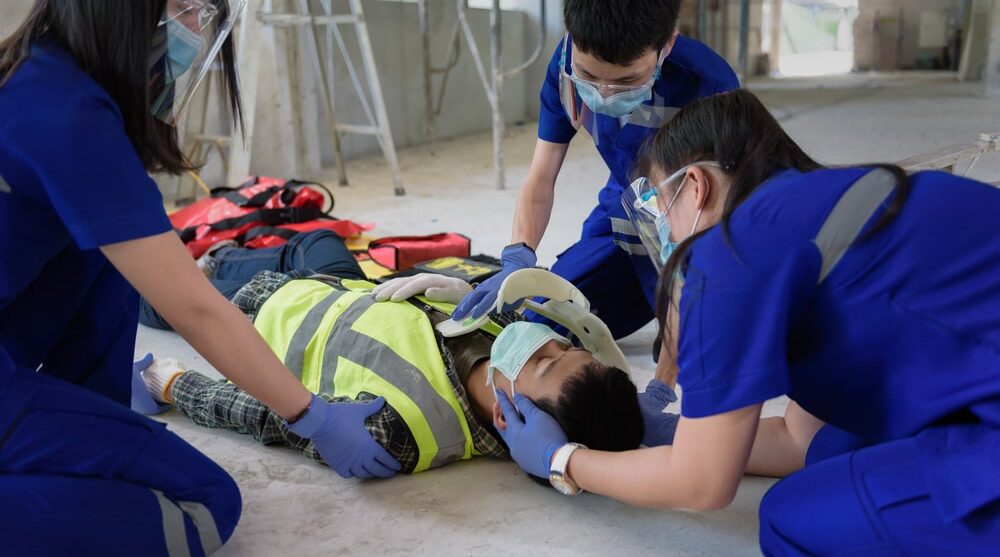 Does someone come in in a life-threatening condition? Usually, we will receive a signal from the ambulance staff in advance that the patient is on the way. To ensure that the right colleagues are ready and that the necessary materials are ready. The first task as an ER doctor will be to stabilize the patient: ensuring that the patient is out of danger as quickly as possible.
Does someone come in in a life-threatening condition? Usually, we will receive a signal from the ambulance staff in advance that the patient is on the way. To ensure that the right colleagues are ready and that the necessary materials are ready. The first task as an ER doctor will be to stabilize the patient: ensuring that the patient is out of danger as quickly as possible.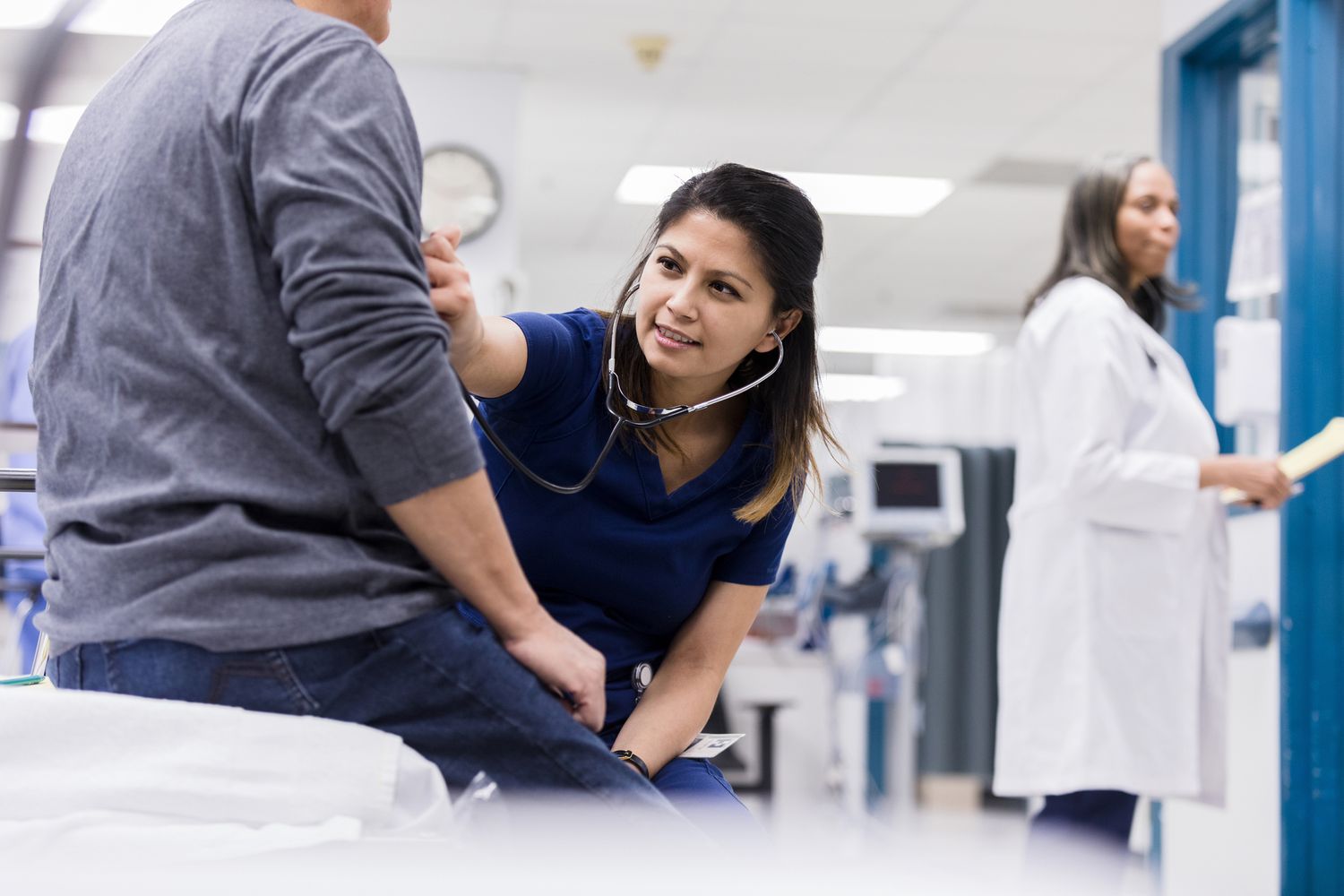 In addition to stabilizing patients, in our hospital we perform physical examinations by the ER physician. Not only with patients who are in mortal danger, but also with patients with other physical complaints. He then make a diagnosis and arrange for the right help. In case, we collaborate with specialists needed for the patient.
In addition to stabilizing patients, in our hospital we perform physical examinations by the ER physician. Not only with patients who are in mortal danger, but also with patients with other physical complaints. He then make a diagnosis and arrange for the right help. In case, we collaborate with specialists needed for the patient.
Core tasks of our ER physician
- Stabilizing patients, or removing danger to life
- perform a physical examination and make an initial diagnosis
- treat patients or refer them to a medical specialist
- managing your colleagues in the emergency department
- consult with medical specialists and other colleagues
 Does someone come in in a life-threatening condition? Usually, we will receive a signal from the ambulance staff in advance that the patient is on the way. To ensure that the right colleagues are ready and that the necessary materials are ready. The first task as an ER doctor will be to stabilize the patient: ensuring that the patient is out of danger as quickly as possible.
Does someone come in in a life-threatening condition? Usually, we will receive a signal from the ambulance staff in advance that the patient is on the way. To ensure that the right colleagues are ready and that the necessary materials are ready. The first task as an ER doctor will be to stabilize the patient: ensuring that the patient is out of danger as quickly as possible. In addition to stabilizing patients, in our hospital we perform physical examinations by the ER physician. Not only with patients who are in mortal danger, but also with patients with other physical complaints. He then make a diagnosis and arrange for the right help. In case, we collaborate with specialists needed for the patient.
In addition to stabilizing patients, in our hospital we perform physical examinations by the ER physician. Not only with patients who are in mortal danger, but also with patients with other physical complaints. He then make a diagnosis and arrange for the right help. In case, we collaborate with specialists needed for the patient.